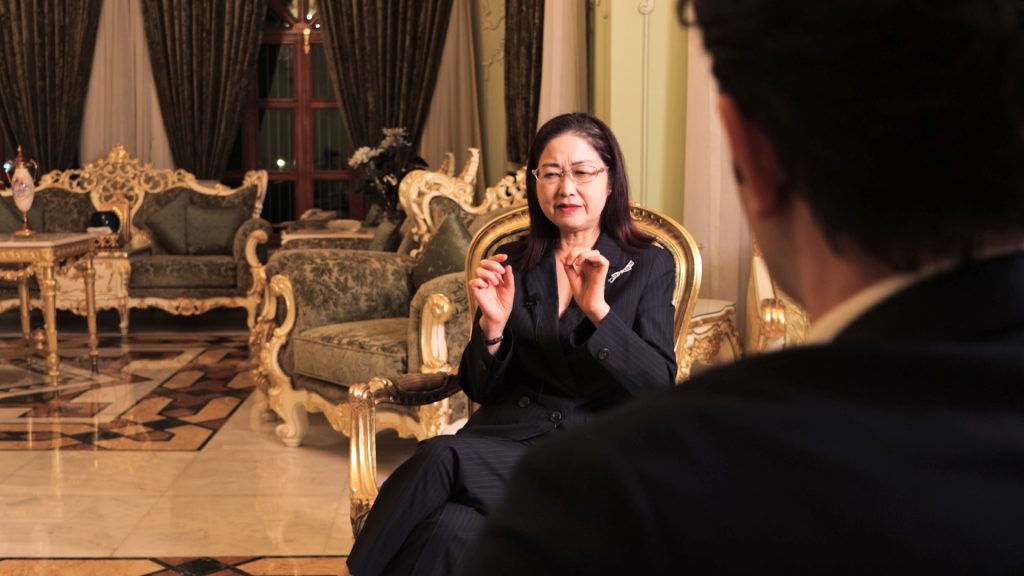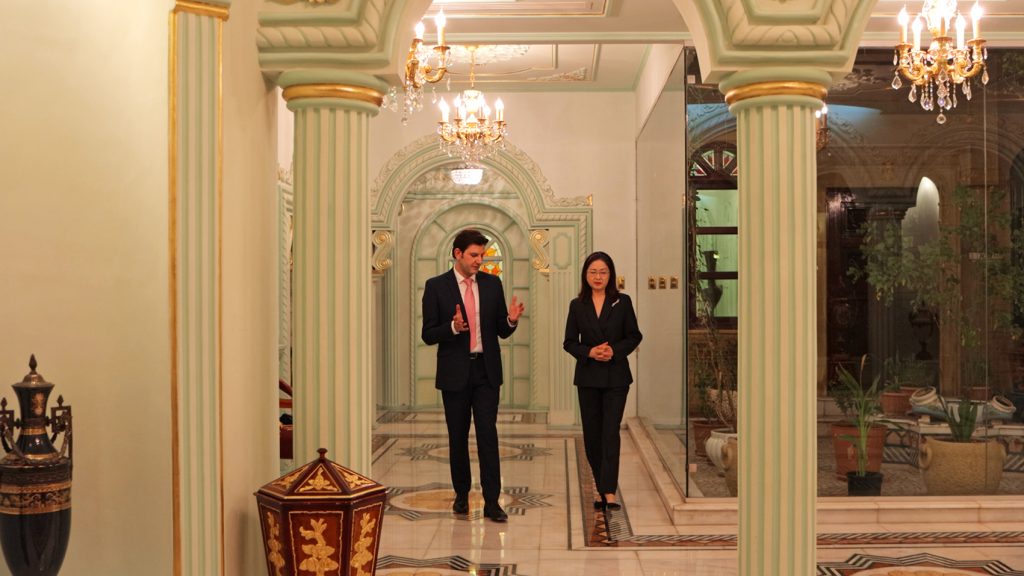



Alexander Woodman
Professor Kasumi Barouch began her music career when she was three years old. As a student of the late Reiko Sato, the distinguished professor in the Opera Department of the Musashino University of Music in Tokyo, Japan, she thrived. Under her talented direction, professor Kasumi developed her exceptional singing talent, and by the age of five, she began to study the piano.
She also studied under the watchful eyes of Kazuko Saruta, Linda Nagy at Brown University, Professor Tony Il-Han at Boston University, and Valentina Lass from the Moscow Conservatory of Music. Notably, Valentina Lass gained fame for teaching piano concerto performances at the New England Conservatory in Boston, Massachusetts. They all had a lasting effect on the creative talent of Kasumi Barouch.
Professor Kasumi went on to perform many exceptional piano concertos in such venues as the Prague Chamber Orchestra, the Moravian Chamber Orchestra, the Czech Ensemble Baroque in Bruno (Czech Republic), and the Boston Chamber Orchestra in Boston (USA). Additionally, she performed at the Orchestra of the Swan in Birmingham (England), the Kurpfälzisches Kammerorchester in Mannheim (Germany), the Hilaris Chamber Orchestra in Bratislava (Slovakia), the Wiener Concertverein in the Musikverein, Wien (Austria), the Miskolc Symphony Orchestra (Hungary), the Sinfonietta Krakovia (Poland), the Sinfonietta Bratislava (Slovakia), and the Georgian Sinfonistta (Georgia).
Audiences were amazed by her performances at piano recitals in Sizuoka, Aomori, Tokyo, Japan, Riyadh, Dammam in the Kingdom of Saudi Arabia, and in many other countries.
Since 2010, professor Kasumi Barouch has also held the honorary position of the principal pianist at the DFO (Dental Family Orchestra) in Tokyo.
I had a great opportunity to sit down with professor Kasumi Barouch and have a conversation at an opulent villa in one of the upscale neighborhoods in Al Khobar. The full version of the interview is available on SaudiReal channel.
Read the full interview transcript below:
Alexander Woodman: You had the honor of being selected as the first female Japanese professor to teach in Saudi Arabia. How do you feel about this distinction, and can you share your views of woman empowerment in the Kingdom?
Prof. K.B.: It may sound strange to some, but I have never had to distinguish between females and males in a negative way. I feel that is a result of my upbringing as well as the acceptance of all people, which is characteristic of my profession. I do feel honored to be the first female professor in Saudi Arabia and am grateful for the confidence they have in me.
A.W.: Did you face any challenges during your experience in Saudi Arabia? Can you discuss the advantages of paving a path for others?
Prof. K.B.: As with any new experience, I can admit that life in Saudi Arabia has had its challenges right from the very beginning of my arrival. I am truly grateful for the respect and manner that I have been treated by the Saudi people and appreciate their hospitality and kindness. Furthermore, I am hopeful that this type of relationship will be the same in any of the countries that host newcomers. Each person should be treated with respect, and we must take every opportunity to express our sincerity and goodwill.
A.W.: At a very early age, you began your career as a musician, and now you are working in the field of science. Can you discuss what you feel was the turning point in your life that convinced you to embark on a new path?
Prof. K.B.: Yes, everyone thought that after I graduated from high school, I would begin a career go to a music university. However, I just did not have the passion for it at that time. Instead, I entered college to study dentistry. My entire family is in the dental field as well as being music lovers. It was quite apparent that my family environment had a strong effect on my life. Upon completing my residency in Periodontics at Boston University, I felt it was the right time for me to become a part-time student at the New England Conservatory in Boston. I waited a long time to follow this path, and music has always been a big part of my life. If I had to choose what occupation I would like to follow in my next life, I would certainly like to be a periodontist and a musician once again.
A.W.: Please reflect on your primary jobs in the fields of medicine and music. Do these completely different fields of employment complement each other in any way? Can you also discuss the healing effect of music in the medical treatment of illnesses?
Prof. K.B.: To me, it is merely a matter of expression and analysis. In my mind, science and music are one entity. Imagine we are all looking at the bright side of the moon; however, there is a dark side which you cannot see from earth. Even though we cannot see it, they both exist. Is that correct?
Most music lovers, including professional musicians, rarely have a chance to perform concertos with an orchestra. Gratefully for me, in Europe, Japan, and in the United States, I have had many opportunities to study and perform concertos with many orchestras. In 2019, my husband and I launched the first Barouch International Concerto Competition in the Republic of San Marino. This competition was for amateur musicians who were over the age of thirty-one. The participants could be employed in any field, but their occupation could not be in music. They were permitted to play any concerto with their musical instruments, including opera singing with an orchestra. The competition was a huge success, and plans for the next one is planned. The second annual Barouch International Competition will take place in 2022 in Prague. That is, if Covid-19 is still not a pandemic. We are hopeful it will take place.
In terms of the healing effect of music, it is clear to me that music can have a tremendous influence on our emotions. When I gave birth to my first child, the Chief Nurse played Mozart to relax all of us. As the sounds of the second movement of the clarinet concerto played, I remember how happy and relaxed I was after and during the birth of my child.
A.W.: While you have been living in Saudi Arabia, can you tell us what symphony continues to echo in your mind? Can you share what symphonic sounds you add to your personal life journey each year?
Prof. K.B.: I would say Schubert No. 5 Symphony. I love colorful sounds that actually speak to me. They quietly whisper messages, which make me laugh and cry at random times. However, I believe that these sounds do not only come from a human being. The wind speaks to us, and the forest sings its own music. I feel that rain also talks, and the sunlight sometimes smiles upon us. I often wish I could produce a lovely aromatic sound on my piano. To me, playing the piano is like a prayer joined with singing that offers beautiful sounds with no explanation.
A.W.: As a musician, you have performed on the finest stages in the world. How does the cultural experience you have on one stage affect your performance in another country?
Prof. K.B.: Yes. The atmosphere, as well as the location of every venue, affects me tremendously. For instance, you must create an atmosphere of enhancement and elegance if the performance is in a less polished area. More importantly, each audience is the mirror of my performance and vice versa. A performer must be aware of their audience’s culture and adjust each performance to please and entertain them.
A.W.: The history of Saudi Arabia and Japan has one concept in common– tradition. Please, discuss the value and significance of that tradition in those countries in the 21st century?
Prof. K.B.: I think tradition is the way to protect our culture regardless of the changes that take place over time. It is not keeping the same process repeatedly; it is changing the plans, which keeps the quality of the process unique and current. Eventually, we will develop a new plan, which then becomes a tradition. Every country has its own customs, which sets them apart from others. The deeper and more creative the culture is, the greater the diversity, which is one of our goals. I grew up in a house surrounded by beautiful things; things that could help us create and compose the poems in our hearts. I hope to always keep that tradition alive.
A.W.: Saudi-Japan Vision 2030, launched by former Prime Minister Abe Shinzo and King Salman, involves nine inter-cultural and economic pillars of collaboration. How do you feel this inter-cultural collaboration can affect these countries’ new generations?
Prof. K.B.: At first, the process of collaboration should have the freedom for each of us to create unique projects. In order to do that, each member of the team is permitted to be as creative as they want to be to create their art. I am confident that the young people in both countries will have a healthy relationship and will enjoy excellent communication on all projects.